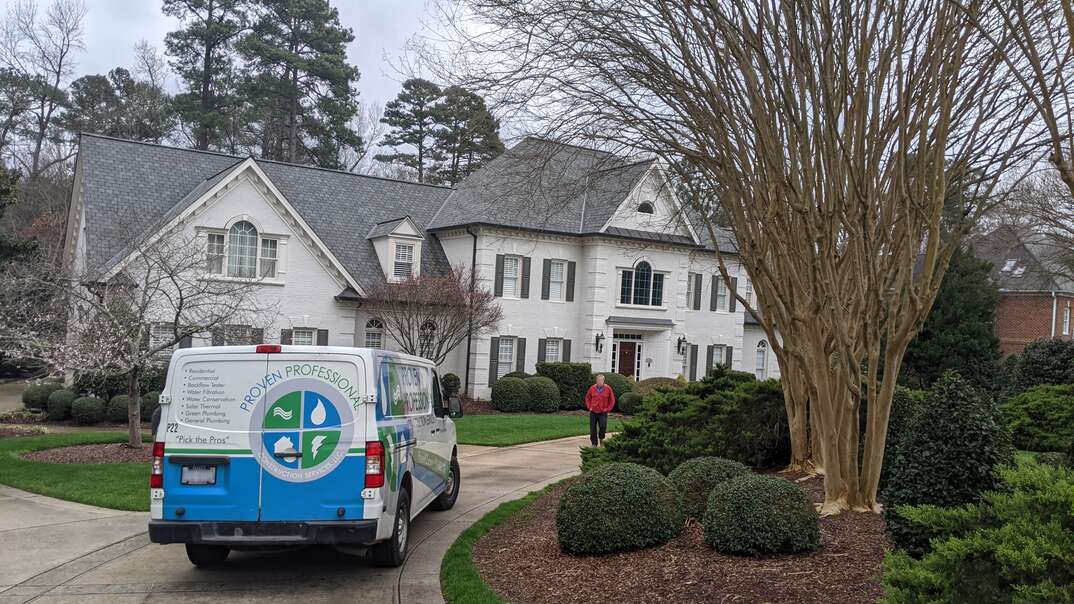- AppliancesElectriciansHVACLandscapingLocksmithPest ControlPlumbingRenovationRoofingT V RepairAll Home Improvement
- Car AccidentClass ActionCorporate LawCriminal DefenseDivorce LawEmployment LawFamily LawFinancial LawLegal AidMedical Injury LawyersMedical MalpracticeReal Estate LawWater Fire RestorationAll Legal
- InvestmentRetirementAll Finance
- Animal InsuranceAutoGeneral InsuranceHealth PolicyHome RentersAll Insurance
- DentalHealth SpecialistsAll Medical
- Animal CareVeterinaryAll Pets
- Auto GlassTowingAll Automotive
What's in My Plumber's Van?

Have you ever wondered exactly what the inside of your plumber's van looks like? Plumbers deal with a wide range of household plumbing issues, and they keep a range of materials and equipment in their vans or trucks so that they're ready for anything.
Well, almost anything. Depending on your plumbing needs, your plumber may not have the right parts on hand. Here’s which items plumbers usually carry as standard and what they might need to order in.
Plumbers carry equipment and materials in their vans to handle everyday household plumbing problems. One of the most common reasons people call a plumber is to clear a clogged drain. Therefore, most plumbers keep a plunger, drain snake and hand auger in their vehicle. Some plumbers may also have a borescope — a tiny camera attached to a cable used to inspect hard-to-reach areas inside pipes and drains.
Plumbers also typically have the items they need to repair and replace pipes:
- Hacksaw
- Plumber's tape
- Pliers
- Pipe cutters
- Flaring tool
- Torch
- Tube expander
- 4-in-1 tube
Plumbers need a variety of wrenches to loosen and tighten the pipe connectors in household plumbing systems. Therefore, most plumbers carry a set of pipe wrenches, an adjustable wrench, basin wrench and faucet key.
A plumber's van contains equipment to help them carry out repairs safely. Plumbers need goggles and gloves to protect their hands and eyes, and they may also carry heat shields to reduce the fire risk when soldering connections.
Common Plumbing Parts
Many plumbers also keep a stock of commonly used plumbing parts so that they can carry out straightforward tasks without purchasing parts or running back to headquarters for each job. Typically, a plumber will have a range of copper and PVC pipe fittings and tubes on hand.
Plumbers also tend to carry pipe valves, which are parts that allow you to turn the water supply to a fixture on and off. A plumber's van often contains straight and angle stops and different ball valve sizes.
Many plumbers carry a range of P-traps and sink traps in their vans, as well as several tailpieces and tubes. P-traps prevent waste gases from traveling up the pipes and entering your home through your fixtures. Plumbers may also have a supply of water connectors and supply tubes to connect new appliances and fixtures to your home's plumbing system.
Plumbers don't typically carry parts specific to particular water heaters and fixtures because they don't need to use them often. Sometimes, your plumber can purchase the necessary parts at a supply store on the same day to complete the job quickly. However, they may need to order in more unusual parts from the manufacturer.
They also aren’t going to have fixtures — like faucets and toilets — or replacement water heaters and water softeners. You’ll need to purchase these products before you call the plumber out to install them.
However, it's often cheaper for plumbers to buy parts in bulk instead of purchasing individual parts for each job. Therefore, your plumber might have more unusual parts in stock if another customer required the same repair recently.
What Kinds of Services Should You Expect the Average Plumber to Provide?
Residential plumbers can perform a wide range of installation and repair jobs. You can expect a general plumber to provide the following services:
- Installing fixtures like sinks, toilets and bathtubs
- Inspecting and testing plumbing fixtures
- Diagnosing issues with household fixtures and performing repairs
- Removing clogs from toilets and drains
- Installing water and gas pipes
- Inspecting pipework and repairing leaks
- Adjusting water pressure
Some plumbers specialize in certain types of plumbing work, but they may also offer the same general services as a residential plumber. For example, sanitary plumbers install and fix residential sanitary systems, but they may also work with appliances like water heaters. Water supply plumbers install and fix household water supply systems, like water storage tanks.
Elocal Editorial Content is for educational and entertainment purposes only. Editorial Content should not be used as a substitute for advice from a licensed professional in your state reviewing your issue. Systems, equipment, issues and circumstances vary. Follow the manufacturer's safety precautions. The opinions, beliefs and viewpoints expressed by the eLocal Editorial Team and other third-party content providers do not necessarily reflect the opinions, beliefs and viewpoints of eLocal or its affiliate companies. Use of the Blog is subject to the
Website Terms and Conditions.The eLocal Editorial Team operates independently of eLocal USA's marketing and sales decisions.



